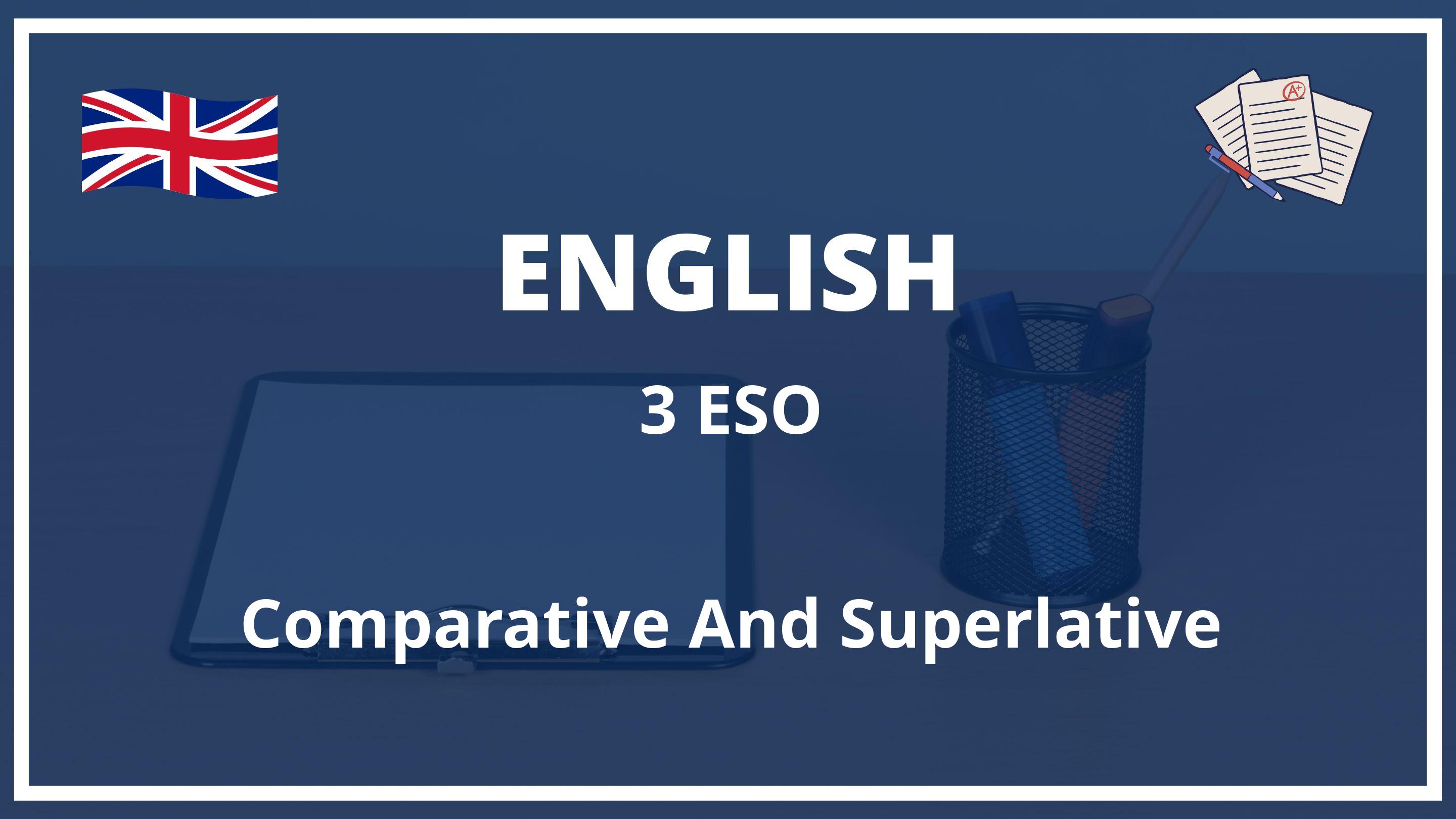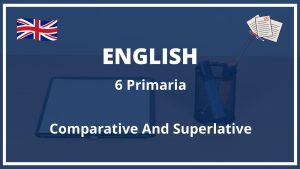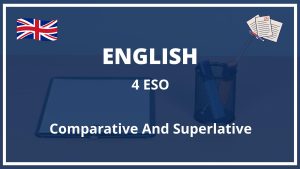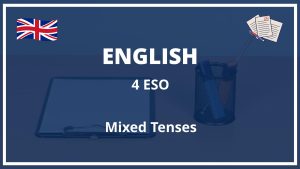
Abrir Ejercicios Comparative And Superlative 3 ESO | Exercices
Comparative and superlative are two different ways of comparing things. The comparative is used to compare two things, while the superlative is used to compare three or more things. For example, if you wanted to compare two dogs, you would use the comparative form of “dog”, which is “bigger”. If you wanted to compare three dogs, you would use the superlative form of “dog”, which is “biggest”.
Here are some more examples:
The comparative form of “good” is “better”, while the superlative form is “best”.
The comparative form of “bad” is “worse”, while the superlative form is “worst”.
The comparative form of “far” is “further”, while the superlative form is “furthest”.
The comparative form of “little” is “less”, while the superlative form is “least”.
To form the comparative and superlative forms of most adjectives, you just add “-er” for the comparative and “-est” for the superlative. For example, the comparative form of “small” is “smaller”, while the superlative form is “smallest”.
There are a few irregular adjectives, however, which have different comparative and superlative forms. For example, the comparative form of “good” is “better”, while the superlative form is “best”. The comparative form of “bad” is “worse”, while the superlative form is “worst”.
When comparing two things, you can use the comparative form with the word “than”. For example, “This dog is bigger than that dog.” When comparing three or more things, you can use the superlative form with the word “the”. For example, “Of all the dogs in the world, this is the biggest.”
Remember, the comparative is used to compare two things, while the superlative is used to compare three or more things. When in doubt, just think about how many things you’re trying to compare.
Here are a few more examples:
I’m the oldest of three siblings.
Of all the countries in the world, Brazil is the largest.
This is the smallest room in the house.
Jimmy is the best basketball player on the team.
Ejercicios Resueltos Comparative And Superlative Ingles 3 Eso
Ejercicios Resueltos Comparative And Superlative Ingles 3 Eso
Los adjetivos y adverbios en grado comparativo de superioridad expresan una mayor cantidad o intensidad de la cualidad que se está indicando. En inglés, el grado comparativo se forma añadiendo -er al adjetivo o adverbio de una sílaba o -est al de más de una sílaba. Observe los ejemplos:
Adjetivos de una sílaba:
tall – taller – tallest (alto)
short – shorter – shortest (bajo)
big – bigger – biggest (grande)
small – smaller – smallest (pequeño)
Adjetivos de dos sílabas:
intelligent – more intelligent – the most intelligent (inteligente)
interesting – more interesting – the most interesting (interesante)
fortunate – more fortunate – the most fortunate (afortunado)
Para formar el grado comparativo de inferioridad se añade la terminación -er al adjetivo o adverbio de una sílaba y -er al de más de una sílaba. Observe los ejemplos:
Adjetivos de una sílaba:
tall – taller – tallest (alto)
short – shorter – shortest (bajo)
big – bigger – biggest (grande)
small – smaller – smallest (pequeño)
Adjetivos de dos sílabas:
intelligent – more intelligent – the most intelligent (inteligente)
interesting – more interesting – the most interesting (interesante)
fortunate – more fortunate – the most fortunate (afortunado)
Para formar el grado comparativo de inferioridad se añade la terminación -er al adjetivo o adverbio de una sílaba y -est al de más de una sílaba. Observe los ejemplos:
Adjetivos de una sílaba:
tall – taller – tallest (alto)
short – shorter – shortest (bajo)
big – bigger – biggest (grande)
small – smaller – smallest (pequeño)
Adjetivos de dos sílabas:
intelligent – more intelligent – the most intelligent (inteligente)
interesting – more interesting – the most interesting (interesante)
fortunate – more fortunate – the most fortunate (afortunado)
Para formar el grado comparativo de inferioridad se añade la terminación -er al adjetivo o adverbio de una sílaba y -est al de más de una sílaba. Observe los ejemplos:
Adjetivos de una sílaba:
tall – taller – tallest (alto)
short – shorter – shortest (bajo)
big – bigger – biggest (grande)
small – smaller – smallest (pequeño)
Adjetivos de dos sílabas:
intelligent – more intelligent – the most intelligent (inteligente)
interesting – more interesting – the most interesting (interesante)
fortunate – more fortunate – the most fortunate (afortunado)
Para formar el grado comparativo de inferioridad se añade la terminación -er al adjetivo o adverbio de una sílaba y -est al de más de una sílaba. Observe los ejemplos:
Adjetivos de una sílaba:
tall – taller – tallest (alto)
short – shorter – shortest (bajo)
big – bigger – biggest (grande)
small – smaller – smallest (pequeño)
Adjetivos de dos sílabas:
intelligent – more intelligent – the most intelligent (inteligente)
interesting – more interesting – the most interesting (interesante)
fortunate – more fortunate – the most fortunate (afortunado)
Para formar el grado comparativo de inferioridad se añade la terminación -er al adjetivo o adverbio de una sílaba y -est al de más de una sílaba. Observe los ejemplos:
Adjetivos de una sílaba:
tall – taller – tallest (alto)
short – shorter – shortest (bajo)
big – bigger – biggest (grande)
small – smaller – smallest (pequeño)
Adjetivos de dos sílabas:
intelligent – more intelligent – the most intelligent (inteligente)
interesting – more interesting – the most interesting (interesante)
fortunate – more fortunate – the most fortunate (afortunado)
Para formar el grado comparativo de inferioridad se añade la terminación -er al adjetivo o adverbio de una sílaba y -est al de más de una sílaba. Observe los ejemplos:
Adjetivos de una sílaba:
tall – taller – tallest (alto)
short – shorter – shortest (bajo)
big – bigger – biggest (grande)
small – smaller – smallest (pequeño)
Adjetivos de dos sílabas:
intelligent – more intelligent – the most intelligent (inteligente)
interesting – more interesting – the most interesting (interesante)
fortunate – more fortunate – the most fortunate (afortunado)
Para formar el grado comparativo de inferioridad se añade la terminación -er al adjetivo o adverbio de una sílaba y -est al de más de una sílaba. Observe los ejemplos:
Adjetivos de una sílaba:
tall – taller – tallest (alto)
short – shorter – shortest (bajo)
big – bigger – biggest (grande)
small – smaller – smallest (pequeño)
Adjetivos de dos sílabas:
intelligent – more intelligent – the most intelligent (inteligente)
interesting – more interesting – the most interesting (interesante)
fortunate – more fortunate – the most fortunate (afortunado)








